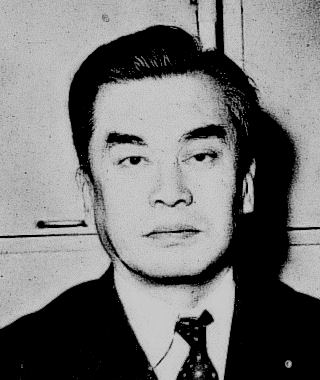Hisatsune Sakomizu
Japanese politician From Wikipedia, the free encyclopedia
Hisatsune Sakomizu (迫水 久常, Sakomizu Hisatsune, 5 August 1902 – 25 July 1977) was a Japanese government official and politician before, during and after World War II.
This article relies largely or entirely on a single source. (February 2024) |
Hisatsune Sakomizu | |
|---|---|
迫水 久常 | |
 | |
| Minister of Posts and Telecommunications | |
| In office 18 July 1961 – 18 July 1962 | |
| Prime Minister | Hayato Ikeda |
| Preceded by | Yoshiteru Kogane |
| Succeeded by | Sakae Teshima |
| Director of the Economic Planning Agency | |
| In office 8 December 1960 – 18 July 1961 | |
| Prime Minister | Hayato Ikeda |
| Preceded by | Wataro Kanno |
| Succeeded by | Aiichiro Fujiyama |
| Chief Cabinet Secretary | |
| In office 7 April 1945 – 17 August 1945 | |
| Prime Minister | Kantarō Suzuki |
| Preceded by | Sotaro Ishiwata |
| Succeeded by | Taketora Ogata |
| Personal details | |
| Born | 5 August 1902 Tokyo, Japan |
| Died | 25 July 1977 (aged 74) |
| Political party | Liberal Democratic Party |
| Alma mater | Tokyo Imperial University |
Career
Sakomizu is well known for serving as the chief secretary to Prime Minister Kantarō Suzuki's Cabinet (April–August 1945).
He was ordered by Suzuki to investigate and analyze the economic condition of Japan, and to give a written confidential report to Suzuki.
Sakomizu found that Japan's resources were rapidly decreasing, and that Japan would be unable to continue fighting the war for more than a few months. Both the air raids and the conquered Japanese territories captured by the United States of America had caused a "great disruption of land and sea communication and essential war production."[1] In addition, coal and oil supplies were found to be in rapid decline, as well as health and support for the war effort.
Sakomizu served as a government officer of the Ministry of Finance in various governmental workplaces until 1945. After WW2, he became a member of the House of Representatives and then joined Liberal Democratic Party.
References
Wikiwand - on
Seamless Wikipedia browsing. On steroids.
